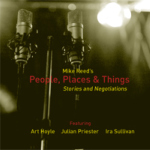|
|
 |
Dusted Reviews
Artist: Mike Reed’s People, Places & Things Album: Stories & Negotiations Label: 482 Music Review date: Apr. 26, 2010 |

|
|
|
 |
Although this is Mike Reed’s third recording with the combo People, Places & Things, he’s had it in mind from the beginning. Reed, a Chicago-based jazz drummer and concert organizer who earns his crust running the Pitchfork musical festival, is a conceptualist. He conceived PPT as a vehicle to examine and revive Chicago’s hard bop avant-garde, which existed 20 years before he was born, using the filters of the city’s contemporary creative music scene. To that end, he convened ubiquitous bassist Jason Roebke, bop-steeped tenor saxophonist Tim Haldeman, and hot-new-thing alto saxophonist Greg Ward, and worked up a book of tunes originally played by Sun Ra’s Arkestra, the MJT+3, and Clifford Jordan and some sympathetic originals, which became the group’s first record. For their second, Reed recruited guest soloist/composers Jeb Bishop, Jeff Parker and David Boykin, all fellow Chicagoans, to show how the group fit within the contemporary community.
But to bring things full circle, PPT had to do the same thing with the people who originally played this stuff. So in 2008 Reed brought back Bishop on trombone and invited tenor saxophonist Ira Sullivan, trombonist Julian Priester and trumpeter Art Hoyle (whose collective CV includes Herbie Hancock, Duke Ellington, Max Roach, Sun Ra, and Art Blakey) to join the group. They played a week of club gigs that culminated in a concert at Chicago’s Millennium Park, where they recorded this record. The material, selected by Reed and arranged by Ward, includes just one tune, “Wilbur’s Tune,” from their earlier records. Besides three originals intended to showcase the elder guests, there are two tunes associated with the Arkestra and one each by Clifford Jordan and John Jenkins.
Stories & Negotiations opens with some free-form exchange between the younger players that would likely have gotten them booted off of any bandstand in the 1950s. More planful harmonies insinuate into the conversation, then after two and a half minutes they pull together on a dime and launch into Jenkins’ “Song of a Star.” Roebke’s virile pulse and Reed’s dancing brushwork encompass the power and agility of hard bop grooving; the solos, most notably by Bishop, are faithful to the idiom’s swing-over-all imperative and loads of fun. The Hoyle tribute “Third Option” has a discursive melody and lush horn charts that pull back like heavy curtains to make room for a pair of soulful statements by the trumpeter and the two younger saxophonists; “The And Of 2,” for Sullivan, is extroverted and catchy enough to have found its way onto a Jazz Messengers record. They make a strong case for Reed as a generous leader and a composer capable of setting up historically faithful scenarios. But it’s on his Priester showcase, “Door #1,” that the concept of eras mixing gets beyond an either/or proposition, with the young guys swapping styles to fit the moment’s requirements and the oldsters sitting out the time-free interludes. Priester makes it happen by holding his own in the free conversation and then rendering an exquisite solo over Roebke’s jewel-like harmonics.
The record’s most satisfying moment comes on a splendidly exuberant version of Sun Ra’s “El Is A Sound Of Joy.” Taken at a much faster gate than the original on Sound Of Joy, the flawless rendering of ts intricate melody must have given the horn players a few new gray hairs. But it’s not the music’s difficulty that you notice so much as the group’s exuberant gospel spirit, which is closer to classic Charles Mingus than Ra and carries over from the vibrant solos to the effortlessly decelerated finale. Never mind the concept -- this stuff is a blast.
By Bill Meyer
|







